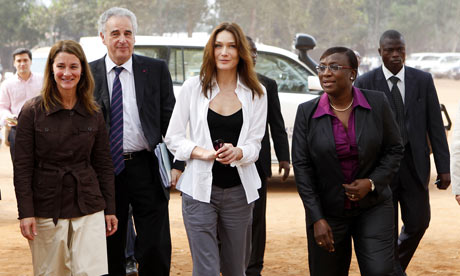Global Fund verdict could be devastating for the fight against Aids
A report from an independent high-level panel finds major flaws in the governance and oversight of the Global Fund in spite of its good work - which could give donors the excuse they want to cut its funding

The Global Fund must "change or wither". That is the devastating verdict of a very intelligent report by the high-level independent review teambrought in following a major crisis of confidence in the Fund, which channels money into developing country programmes for Aids, TB andmalaria. Stories emerged at the end of last year of fraud and corruption among countries taking Global Fund money. In January, Germany suspended its payments and there was talk of other donor nations turning away.
The review, chaired by former US health secretary Michael Leavitt and former President of Botswana Festus Mogae, lays it on the line for the Fund. It gives it every credit for its emergency response to the disaster of Aids a decade ago, when it was set up specifically to raise money for much-needed drugs to keep people in Africa and Asia with HIV alive - although it suggests even then that pouring money into three diseases distorted health budgets in poor countries. But the halcyon days when rich governments competed to show their generosity to the poor are over, it says. The Fund, if it is to continue its great work, has to adapt to a very different and more difficult economic climate.
Austerity among the donors makes the Global Fund more vulnerable now than at any time in its history... Of necessity, the Global Fund is entering an era of consolidation, not expansion. During six months of work, the Panel has seen a high degree of vulnerability and accelerating deterioration in the Global Fund's financial outlook for the next three years. As a result, based on current estimates from the Secretariat, the Global Fund's Board will have substantially less to devote to new grants in round 11 than the estimate of $1.5 billion published in May 2011. The Panel finds this situation a cause for deep concern.
Good intentions and enthusiasm for saving lives has not been enough. The fiduciary controls put in ten years ago are not adequate to ensure the money goes where it is most needed and is not syphoned off by fraudsters. It is everybody's fault, says the Panel - the Board but also the donors and recipients. In the scramble to save lives, governance and oversight were not as strong as they should have been in the early years.
The Global Fund has accepted and embraced the criticism in a very creditable way - as you would expect of this organisation. Simon Bland, chair of the Board, called it a "balanced and objective and pretty thorough analysis" of the past ten years. The reforms it recommended were already underway, he said. He talked of zero tolerance for corruption and learning lessons from the past "to strengthen the business model for the future".
Will it be enough? We will know before very long. Unfortunately, as the report spells out in very clear terms, donor governments are looking for opportunities to retrench, to spend less in these austere times. The changes in the Global Fund have to happen fast and convincingly. To quote again from the review:
The panel believes a combination of economic distress among donor nations and the OIG reports that prompted the creation of this review imperil the sustainability of the Global Fund more than the organisation has acknowledged. A new economic reality, new technologies and new epidemiological patterns compel the Fund to adjust, and it must reform itself to remain relevant.
Friends and supporters of the Global Fund's work - as well as those who fear Aids, TB and malaria are once more slipping into the forgotten zone - have good reason for concern. Gareth Thomas, former international development minister in the UK, is one of those.
There is a commitment to trying to get 15 million people on treatment by 2015, I can't see that being met at this stage with funding dropping.
The problems of the Global Fund must not be an excuse for Britain and other donors to cut back on Aids spending, he said. In a speech on Wednesday to the UK Consortium on AIDS and International Development, Thomas says he will describe AIDS as a 'forgotten epidemic'. He will argue that ministers are ignoring HIV and AIDS and in particular that they are failing to make any serious effort to galvanise funding for fighting the epidemic.
Funding for tackling AIDS in the worst-hit countries from donor governments fell by 10% last year (2010). United States funding dropped 10%. Funding from Spain dropped 38.3%, from Germany funding declined by 23.1%, Sweden 18.1%, the European Community 13.9% (figures from UNAIDS/Kaiser foundation).
Lives will not be saved unless AIDS is given a much higher priority by European and US ministers. The UK should return to its earlier strong advocacy position, by taking a far more active lead in helping to reverse the loss of interest in AIDS by the international community.
Unless the Global Fund can come back fighting - stronger, more transparent, leaner and fitter than before - this is so unlikely to happen.
















































No comments:
Post a Comment